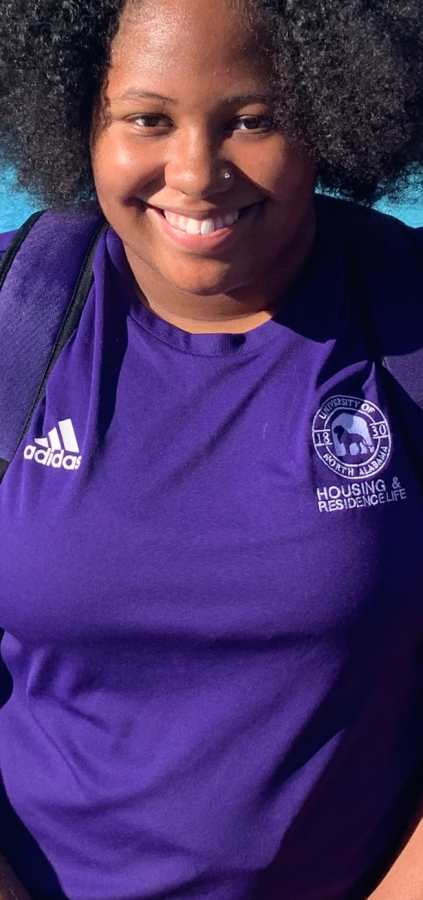LeLe McCary: “If not woke, then sleep”
October 31, 2019
Aliyah “LeLe” McCary grew up surrounded by black historical figures – Malcom X, Martin Luther King Jr., Rosa Parks.
“As a kid, I wondered who these people were,” McCary said. “I didn’t know until I got older and became more cautious of my history. They all contributed something so that I could be here as a black woman and student.”
It was not unusual for McCary to look on the wall and to see portraits of Harriet Tubman, Langston Hughes and Elijah Muhammad. Her mom made sure to put these photographs around the house so McCary would know where she had come from, and know the important figures who paved the way for her.
Being surrounded by this instilled a sense of pride and self-worth in McCary that is still in her today. It prompted her to want to know about her culture, to speak out against injustice and embrace the positive.
“I’ve always been exposed to [people of color],” said McCary, a sophomore at the University of North Alabama. “As I got older, my mind has changed, time has changed but I still have the same mission. I’m trying to break those chains of this new form of suppression.”
McCary celebrates her heritage by being an outspoken activist for black rights. Very often, she will raise the question to those around her, “If you’re black and you’re not woke, then what are you?”
“As a black American, I felt like I had to do something,” McCary said. “I just feel like in this generation, with social media, I don’t understand why others don’t want to do anything. There are things going on [in the world and on this campus] that need to be changed and it just takes one voice to just do something. It doesn’t have to be big.”
She acknowledges that it will not necessarily be easy to make these changes, and accepts the challenges that lie ahead.
McCary went to school in Birmingham, Alabama through the Homewood School System, where she was one of few black students enrolled. At Homewood, she felt out of place because there, her push for black equality was not truly accepted by her classmates.
McCary said a lot of people mistook her outspokenness for a “bad attitude.”
“I left [Homewood] to go to a black school named Ramsay for two years,” She said. “It was the same issue then. They didn’t know me. It upset me when I was unaccepted there so I went back to Homewood. It’s sad that I felt more comfortable there than at Ramsay.”
McCary said her experience at Ramsay was one of the reasons why she did not want to go to a historical black college university (HBCU).
“I’ve only experienced one racial thing with UNA,” McCary said. “UNA is not a bad school, but it could definitely be more diverse. I remember I tried to be in LaGrange Society and I told them straight up, ‘you need more black people in here.’”
McCary said it is the same with UNA and other predominantly white institutions (PWI), they are OK with black people making money for them in sports, but when they need representatives blacks are not being picked.
“I tried out for SOAR and didn’t get in,” She said. “They shouldn’t say that blacks aren’t participating because when I went in for an interview there was a whole line of black people, they just didn’t pick us. LaGrange Society, SOAR – how many Hispanics, Asians? It’s not just about black rights – it’s about colored people’s rights. That’s just the diversity UNA needs to have.”
Joan Williams, the Director of Diversity and Institutional Equity, said she met McCary last semester when she did an interfaith dialogue program, speaking on finding commonalities between different religions.
“She was very talkative within the group,” Williams said. “She was interested in what we’re talking about, and then later on, maybe the next couple of weeks, she came by my office. I encourage my students to just come by and sit and talk with me, and she told me that she had applied to be a navigator with international affairs and that she applied to be in LaGrange.”
Williams said that she was really impressed when she told her how she spoke up. She speaks up for what she believes in and does in a very diplomatic way.
“It’s really something to be admired,” Williams said. “She told me how she thought LaGrange needed more diversity, more people that looked like her. She kind of recognized that she didn’t get chosen because of that comment, but she recognized that she believed it had a positive impact on the people that interviewed after her and that was just really insightful.”
Williams said she does not see that very often in students.
“My grandfather, my mom’s dad did sit-ins the sixties and my dad’s family came from sharecropping,” McCary said. “Before sharecropping, what was my family? They were probably slaves. They didn’t have the opportunity to speak up the way I can now.”
With everything that is going on politically, systematically, McCary feels like she has many opportunities that her ancestors did not have.
“Life is too short [to keep quiet],” McCary said. “Everyone has their purpose in life. What do you want to be remembered for?”



![Caleb Crumpton [COURTESY OF UNA SGA]](https://theflorala.com/wp-content/uploads/2024/07/caleb-crumpton-courtesy-of-SGA-425x600.jpg)






